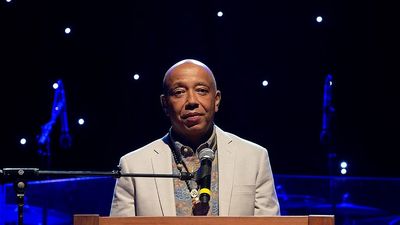'On The Record' Details How Russell Simmons's Sexual Assault Allegations Became Hip-Hop's First Me Too Moment
Despite its shortcomings, On The Record, which premiered at Sundance, serves as a reminder of what Black women lose when they put Black men before their own safety.
We are in the age of the sexual assault documentary — an outgrowth of our fascination with true crime and the increasingly loud and vital rumbling of the Me Too movement. Leaving Neverland, Surviving R. Kelly, and the Harvey Weinstein documentary Untouchable have already made their mark on HBO, Lifetime and Hulu, respectively. Kirby Dick and Amy Ziering’s film On the Record — a documentary about the sexual assault allegations against Russell Simmons — was supposed to follow suit by bringing the Me Too documentary to the new streaming service, Apple TV+. But following Oprah Winfrey pulling support from the project, the documentary, which premiered just last week at the Sundance Film Festival, is now seeking other distribution options. This has been a shocking development, further complicated by conflicting reports as to why Winfrey pulled out, who convinced her to do it, and what that says about the film’s centerpiece — survivor Drew Dixon. Dixon has now become a target for scrutiny, an outcome that is even more upsetting when we consider the ways media, culture, and the criminal justice system has made it difficult for survivors to share their stories.
READ: The 2010s — The Decade When Black Films Became Highbrow
The film centers on Dixon (as well as survivors Sil Lai Abrams and screenwriter Jenny Lumet) providing a cinematic record of her life and the ways in which Simmons derailed her career in music. These stories are bolstered by talking-head interviews from various Black women in media and academia, including feminist scholar Kimberle Crenshaw, radio producer Bim Adewunmi, and writer Shanita Hubbard. These women do a lot of heavy lifting for the documentary’s white filmmakers who do not appear to be well-versed in misogynoir. For example, Dixon, Lumet, and Abrams all make reference to their light-skinned privilege as it relates to media reaction to their stories. Whenever their privilege is mentioned, however, the film doesn’t know what to do with it. The subject rarely comes up in the talking head interviews the filmmakers conducted, even though notably many of the women speaking are darker-skinned than the survivors on screen. Black filmmakers may have perhaps set aside a portion of the film to discuss the different ways dark-skinned women and light-skinned women are perceived in the music industry. As I watched the film, I kept wondering: Did Simmons have any dark-skinned victims? And if there were any, why didn’t they appear on screen?
Perhaps there weren’t any. Perhaps Russell was consistent in going after light-skinned Black women and white women. Regardless, the question should have been asked. When we discuss the history of hip-hop, especially through the lens of the women who were there, we must prioritize discussion regarding the plight of Black women in life and workspaces alike. Important key figures from the time such as Lil’ Kim and Foxy Brown don’t come up at all, even though their stories within the music industry would likely bolster the film and provide a more accurate overall snapshot of the time. This is something that the Academy-Award winning docu-series OJ: Made in America understood all too well. The story of O.J. was also a story about the Civil Rights Movement, the race riots in California, and the American Dream as Black people understand it. Similarly, the story of Simmons and the women he abused is the story of misogynoir, the fallout of the Women’s Liberation Movement of the '70s, the Reaganism of the ‘80s, and hip-hop itself. By leaving Dixon to fill-in most of the historical blanks, the filmmakers reveal a lack of interest in truly embracing their subject matter.
READ: 10 Topics Netflix's 'Hip-Hop Evolution' Should Cover For Future Seasons
Perhaps the film’s Achilles heel is the way that it is framed around Dixon’s participation in the New York Times article that brought her story to light. This framework grounds the film as a strictly upper-middle class story, which makes it all the more jarring when we’re introduced to Mercedes Ladies founder and Bronx native Sheri Sher halfway through the film. Once Sher began filling in her history and the history of hip-hop in the Bronx, I couldn’t help but wonder what the film would have looked like if the stories had begun at the beginning of hip-hop culture in the late '70s. That is when Simmons began, and likely where his history of assaulting women began too.
Abrams, Dixon, Lumet, Sher and the countless other survivors whose testimony we bear witness to within the film deserved a much more expansive platform for their stories. They carry the film on their backs when they shouldn’t have to. Regardless of its shortcomings, On the Record does one big thing correctly. The film reminds us that Me Too is also a workplace issue, and as the film closes we are forced to wonder what hip-hop would be now if women had not been so deliberately and systematically forced out. The film serves as a compelling reminder of what Black women lose when we put Black men before our own safety.
__
Jourdain Searles is a writer, comedian, and podcaster who hails from Georgia and resides in Queens. She has written for Bitch Media, Thrillist, The Ringer, and MTV News. As a comic, she has performed stand-up in venues all over New York City, including Union Hall, The People Improv’s Theater, UCB East, and The Creek and the Cave. She can be found on Twitter.
